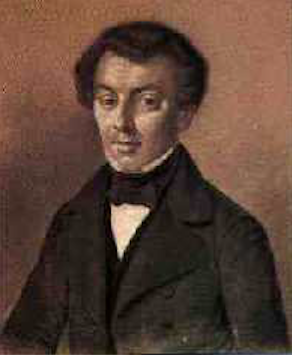'Every Baptist is a missionary': How Johannes Gerhard Oncken evangelised Europe

'Every Baptist is a missionary.'
This resounding phrase was the motto of a 19th-century Baptist hero, almost unknown in the UK but revered in Europe as the 'Father of Continental Baptists'. By his immense energy, organisational skills, commitment to evangelism and sacrificial faith he was responsible for the founding of hundreds of churches and the saving of thousands of souls. Baptist work across Europe today exists because of the ministry of Johannes Gerhard Oncken.
Oncken was born today in 1800 in what is now Germany and died in 1884. He was apprenticed to a Scottish merchant and later moved to London, being converted at a Methodist church there.
He returned to Germany as a missionary and started the first Sunday school in Germany there. He later worked with the Edinburgh Bible Society, estimating in 1879 he had distributed around two million Bibles.
Oncken adopted Baptist views and was baptised by immersion by night in the river Elbe by the American scholar and educationalist Barnas Sears, who was to become president of Brown University. He, his wife and the five others baptised that night formed a Baptist church and the work began to spread.
Germany was deeply hostile to Baptist theology, a viewpoint resulting from the excesses of the Anabaptists during the Reformation. They had risen in revolt and formed a sort of commune at Munster, which was suppressed with much bloodshed. The authorities feared a return to the terrible wars of religion that had devastated the region, and Oncken and his followers faced great hostility. Oncken himself was imprisoned for four weeks in Hamburg's Winserbaum prison, built on stilts over sewage drains. He was told he would only be released if he promised not to preach, but refused. It left him with permanent chest troubles through constantly breathing in the gas.
The Baptists won a measure of toleration because of their courage and generosity during a great fire in Hamburg in 1842.
Oncken knew personal tragedy. His first wife Sarah, from London, died in 1845. Of their seven children, three died – the youngest son, Philip, tragically burned to death at the age of eight. Oncken took the funeral and broke down in tears. He was to marry twice more: to Ann Dogshun, a Yorkshire widow who died in 1873, and Jane Clark, in 1875.
Oncken started a seminary in Hamburg and cooperated with several international Bible societies. He travelled widely throughout Europe, sometimes secretly because of the opposition he faced. In Denmark Baptists were imprisoned for their faith and Oncken was declared an outlaw; in other countries the children of Baptists were taken from their parents and baptised by force by Lutheran ministers. He wrote: 'Our baptisms all took place under cover of the night and on my missionary tours, which were frequently extensive, I was banished successively from almost every State in Germany. I could never travel as an honest man by daylight, but was compelled to journey on foot in the darkness, to hold services, examine candidates, administer the ordinances, and form churches in the dead of night, and take care to be across the frontiers before break of day for fear of my pursuers'.
George M Ella in an article on Oncken for Biographica Evangelica writes: 'He constituted no less than 280 Baptist churches, 1,222 preaching stations or "daughter churches" and 771 Sunday Schools in Germany.
'He also founded over 170 churches in Scandinavia and the Slavic states. The total membership of these churches, not including 17,000 Sunday School scholars of various ages, was one hundred and fourteen thousand believers. These figures do not include unbaptised family members.
'In the history of the Church, there have been few labourers who, by the power of God, have been so successful in bringing salvation to the lost.'
Follow Mark Woods on Twitter: @RevMarkWoods











